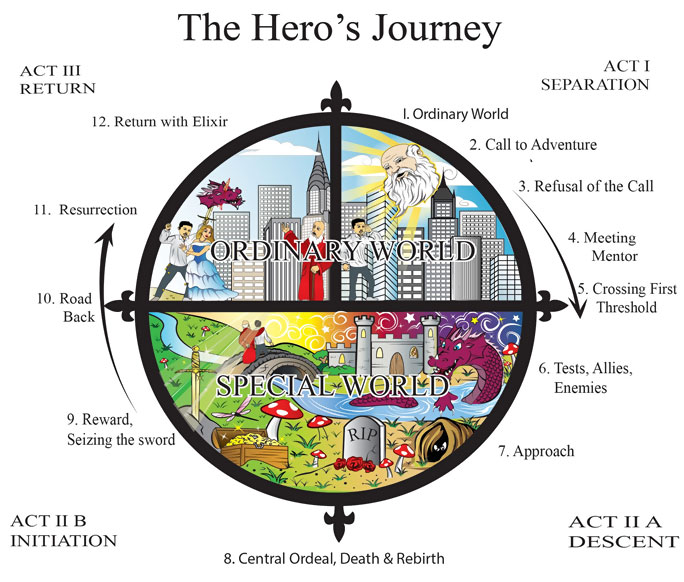December 31, 2019 | by David March.
The concept of the hero is a very deep and important one in American history. Stan Lee, the creator of the legendary Marvel superheroes, famously inspired and brought about hope to many people with his first comic book character in 1940: Captain America.
There are many things to be said about why this hero image brings up inspiration and hope for others. The hero shows us that despite his or her own shortcomings and obstacles, success is possible.
In watching heroes, we often feel a vicarious sense of liberation and freedom watching them break through the inertia of despair. As the hero overcomes his external antagonists, personal problems, and hopelessness. They shows us through their courage and determination that we are capable of achieving greatness, even if against great odds.
Practically speaking, what each one of us needs to feel confident in our job search or career search will look different. However, we all could use inspiration, hope, support and love: the support that would give us the faith that we can face down our fears, thus, ignoring whatever voices to the contrary we have heard during our lives, as we press forward.
How does this relate to your job search? You need to be the hero of your own career.
How You Can Be the Hero of Your Career
Being the hero of your career means you are the primary catalyst of causation of your life rather than the effect of it. It means taking more responsibility for your career success and continuing to make causes for it.
Thus, we can each become the scriptwriter of our own lives. We are the protagonists of our own stories. As we write and perform the script of our lives, we pass through several stages: each of those are described in what is called the “Hero’s journey.”
What Is the Hero’s Journey?
In a section of my book, Vision in Action, (2017) I explain that the The Hero’s Journey was first hypothesized by Joseph Campbell in his book The Hero with a Thousand Faces (2008). It originally had 17 steps and the names of each step were cryptic and complex. He was definitely the pioneer of the idea and understood how myths, folklore, as well as culture worked like no one else.
Later on Joseph Campbell met with George Lucas and became his lead story consultant. From the very first movie until the star wars movies out now. The Structure of the hero’s journey has lived on.
However, the 17 steps that were once cryptic and complicated for most person to utilize and understand have changed. Christopher Vogler tackled this idea of “The Hero’s Journey,” in his book The Writers Journey. He simplified the idea while keeping much of its power and complexity intact.
He made it into 12 steps and much easier to grasp. The following is from his book..
“The Hero’s Journey is a skeletal framework that should be fleshed out [and filled in] with the details and surprises of [your own] individual story. The structure should not call attention to itself, nor should it be followed too precisely.” (p.19, The Writer’s Journey)
In this sense, you are starring in your own movie, playing out the role you choose.
In The Writer’s Journey, Christopher Vogler provides a simplified and practical guide to the Hero’s Journey (p. 19):
- Heroes are introduced in the ordinary world.
- Then, they receive the call to adventure.
- They are reluctant at first or refuse the call, but
- are encouraged by a mentor
- cross the first threshold and enter the special world.
- They encounter tests, allies, and enemies.
- They approach the inner most cave, crossing a second threshold,
- where they endure the (central) ordeal.
- They take possession of their reward and
- are pursued on the road back to the ordinary world.
- They cross the third threshold, experience a resurrection, and are transformed by the experience.
- Finally, they return with the elixir—a boon or treasure to benefit the ordinary world.
To assist you in understanding the Hero’s Journey, you will see an illustration from the book, Vision In Action.

The Greatest Obstacles in Career Search
The Hero’s journey aside, lets talk about what can hold you back. I believe the career search or job search is an internal battle in which we go deep into our own lives and figure out why and what we want out of life. Let’s start with why.
Why are we more inclined to one career direction over another, Is it because of fear? The fear of income instability because this means your bills won’t be paid, or, even worse: you’ll fail to feed your kids Do we fear our parents scorn because we didn’t take the safe path they suggested or even provided for us? Many times, we take actions out of self-preservation with a mindset of lack, or simply protecting our position. Playing it safe and not getting hurt.
Maybe you were told there is no money in art or no money in making music or no money in cage-fighting. Moreover, parents or significant others may believe it’s a waste of time and effort and you would do better focusing on getting a “real” job.
You could also be in a different situation: You don’t want to leave a current job because things are okay and you’re paid well, but it’s a toxic environment and sucks up all your time so you don’t have the time to do the things you love and enjoy. It is common for people to prefer familiar hells than strange, unknown heavens.
To really be the hero of your own career, you need COURAGE. You are putting yourself in an unfamiliar arena. Simply put, you are putting yourself out there. There are risks involved. You may experience failures before successes. This is not a reason to give up. You pick yourself up and do it again. You must recognize that you are now one step closer to where you are supposed to be.
Hypothetically, this is how a hero’s journey would look like for your job search.
The Hero’s Journey for Your Job Search
1. Ordinary World
The journey starts in the ordinary world when you feel dis-satisfaction at your current job. Or the desire for more money, a better environment, or a different line of work altogether.
2. Call to Adventure
The “Call to adventure” is when you start to update your resume with previous and present accomplishments and get it ready to send.
3. Refusal of Call
The “Refusal of call” – is when you are afraid of what people might think; so, you hold back and hesitate. You freeze. You save your updated resume and don’t actually put yourself out there.
4. Meeting the Mentor
“Meeting the mentor” – here you get encouragement from a family member, significant other, friend, or something you read. So, you take action. You put your resume out there on job boards and apply to positions you have interest in.
5. Special World
You enter the “special world” of your individual job search. You have DECIDED to go on the interviews.
6. Tests, Enemies, and Allies
You experience rejection. So, you put your guard up. People make all kinds of comments. Perhaps you missed work, or you show up late. You encounter what you could call “enemies.” You must redirect rejection. You also meet ALLIES: perhaps a Recruiter from a staffing agency; perhaps a career coach. You become ready for your next phase.
7. The Approach
The approach – You get closer to landing a dream job. You work on your interview skills, as well as read up on the hiring manager. You get insights on knowing the hiring manager’s trigger points. Then, you prepare explanations of how your past performance will indicate future results.
8. Central Ordeal
Central Ordeal – did you get the job? You are in a waiting period after the final interview.
9. Reward
Reward – you get an offer letter that you got the job.
10. The Road Back
The road back — previous employer wants to give you a counter offer, such as more money, a different department, or better work environment.
11. Resurrection
You are indecisive. Should you go or stay? Transformation – resurrection.
As I discuss in my book, Vision in Action, decision mapping and reviewing previous goals are best here. Using decision mapping, the idea of should I stay at my current organization or should I leave gets broken-down into a number of different criteria. You’ll learn more about it in the article “Will Your Career Goal Make You Happy or Its Pursuit?”
The criteria are specific to this individual’s decision-making process towards moving or staying with the current company. They are rated by their importance on a scale of 1 – 10 and these numbers go next to each criteria in order for you to see the true pains and gains.
12. Return With the Elixir
Return with the elixir…. You made your decision. As a result, you have what you set out to get.
This is just one example, each journey is different; therefore, each road map is personal. There are many factors at play in every journey. The key is to have a central goal in mind and a strategy to help you stay determined, open and focused on progress of that goal.
I’ll discuss more strategies in the upcoming articles. Stay tuned.
To take the next step, schedule a call with me at https://calendly.com/coachdavemarch/
Would you like to learn what career path suits you best? Take my free test to find out!
GET MY FREE TRAINING
Access resume-writing, career and personal development insights, straight to your inbox
Your information will be used in accordance with our Privacy Policy

